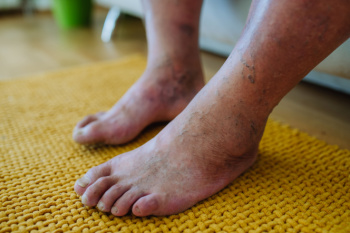Blog
Foot Alignment Problems in Children

Pediatric foot alignment deformities are common conditions in growing children and can affect how their feet develop and function. These deformities include flat feet, where the arches do not form properly, or conditions like in-toeing, where the feet turn inward. These issues often arise from the natural development process or genetic factors, and in most cases, children outgrow them without treatment. However, when foot alignment deformities cause pain, difficulty walking, or limit a child’s activities, they may require medical attention from a podiatrist. Treatment options can include stretching exercises and custom orthotics to correct the alignment and relieve discomfort. If you have a child that is complaining or showing foot discomfort, it is suggested that you schedule an appointment with a podiatrist to help monitor the condition and determine if any treatment is necessary to support healthy foot development in the growing years.
The health of a child’s feet is vital to their overall well-being. If you have any questions regarding foot health, contact one of our podiatrists of Pennsylvania. Our doctors can provide the care you need to keep you pain-free and on your feet.
Tips for Keeping Children's Feet Healthy
- Make sure their shoes fit properly
- Look for any signs of in-toeing or out-toeing
- Check to see if they have Clubfoot (condition that affects your child’s foot and ankle, twisting the heel and toes inward) which is one of the most common nonmajor birth defects.
- Lightly cover your baby’s feet (Tight covers may keep your baby from moving their feet freely, and could prevent normal development)
- Allow your toddler to go shoeless (Shoes can be restricting for a young child’s foot)
- Cut toenails straight across to avoid ingrown toenails
- Keep your child’s foot clean and dry
- Cover cuts and scrapes. Wash any scratches with soap and water and cover them with a bandage until they’ve healed.
If you have any questions, please feel free to contact one of our offices located in Plymouth Meeting and Ambler, PA . We offer the newest diagnostic and treatment technologies for all your foot care needs.
How Diabetes Can Affect the Feet

Diabetes can have serious effects on the feet due to poor circulation and nerve damage, known as diabetic neuropathy. Reduced blood flow to the feet can delay the healing of cuts, blisters, or sores, increasing the risk of infections and, in severe cases, leading to ulcers or even amputation. Neuropathy can cause a loss of sensation in the feet, making it harder to detect injuries or changes in skin condition, which can go unnoticed and worsen over time. A podiatrist plays a critical role in diabetic foot care. They can perform regular foot exams to identify problems early, treat wounds, and recommend proper footwear or custom orthotics to prevent pressure points. Podiatrists also offer guidance on daily foot care routines, such as inspecting feet for sores and maintaining good hygiene. If you have diabetes, it is strongly suggested that you schedule routine podiatric visits to help manage diabetes-related foot complications and reduce the risk of serious issues.
Diabetic foot care is important in preventing foot ailments such as ulcers. If you are suffering from diabetes or have any other concerns about your feet, contact one of our podiatrists from Pennsylvania. Our doctors can provide the care you need to keep you pain-free and on your feet.
Diabetic Foot Care
Diabetes affects millions of people every year. The condition can damage blood vessels in many parts of the body, especially the feet. Because of this, taking care of your feet is essential if you have diabetes, and having a podiatrist help monitor your foot health is highly recommended.
The Importance of Caring for Your Feet
- Routinely inspect your feet for bruises or sores.
- Wear socks that fit your feet comfortably.
- Wear comfortable shoes that provide adequate support.
Patients with diabetes should have their doctor monitor their blood levels, as blood sugar levels play such a huge role in diabetic care. Monitoring these levels on a regular basis is highly advised.
It is always best to inform your healthcare professional of any concerns you may have regarding your feet, especially for diabetic patients. Early treatment and routine foot examinations are keys to maintaining proper health, especially because severe complications can arise if proper treatment is not applied.
If you have any questions please feel free to contact one of our offices located in Plymouth Meeting and Ambler, PA . We offer the newest diagnostic and treatment technologies for all your foot and ankle needs.
Causes and Effects of Ankle Sprains

An ankle sprain occurs when the ligaments surrounding the ankle joint are overstretched or torn, often resulting from an awkward step or a sudden twist. Ankle sprains can happen during sports or everyday activities, such as walking on uneven ground or tripping on stairs. Common symptoms of ankle sprains include pain, swelling, bruising, and difficulty putting weight on the affected foot. While mild sprains typically heal with rest, more severe cases may require additional support, such as braces or splints to aid in recovery. Ignoring a sprain can lead to long-term instability and recurring injuries. A podiatrist can assess the severity of your ankle sprain, recommend the proper treatment, and guide the rehabilitation process to prevent future complications. If you believe you may have sprained an ankle, it is suggested that you schedule an appointment with a podiatrist for a diagnosis and treatment.
Although ankle sprains are common, they aren’t always minor injuries. If you need your ankle injury looked at, contact one of our podiatrists from Pennsylvania. Our doctors can provide the care you need to keep you pain-free and on your feet.
How Does an Ankle Sprain Occur?
Ankle sprains are the result of a tear in the ligaments within the ankle. These injuries may happen when you make a rapid shifting movement while your foot is planted. A less common way to sprain your ankle is when your ankle rolls inward while your foot turns outward.
What Are the Symptoms?
- Pain at the sight of the tear
- Bruising/Swelling
- Ankle area is tender to touch
- In severe cases, may hear/feel something tear
- Skin discoloration
Preventing a Sprain
- Wearing appropriate shoes for the occasion
- Stretching before exercises and sports
- Knowing your limits
Treatment of a Sprain
In many cases, the RICE method (Rest, Ice, Compression, and Elevate) is used to treat ankle sprains. However, you should see a podiatrist to see which treatment option would work best with your injury. In severe cases, surgery may be required.
It is important to ask your doctor about rehab options after you receive treatment for your injury. Stretching, strength training, and balance exercises may help the ankle heal while also preventing further injury.
If you have any questions, please feel free to contact one of our offices located in Plymouth Meeting and Ambler, PA . We offer the newest diagnostic and treatment technologies for all your foot care needs.

